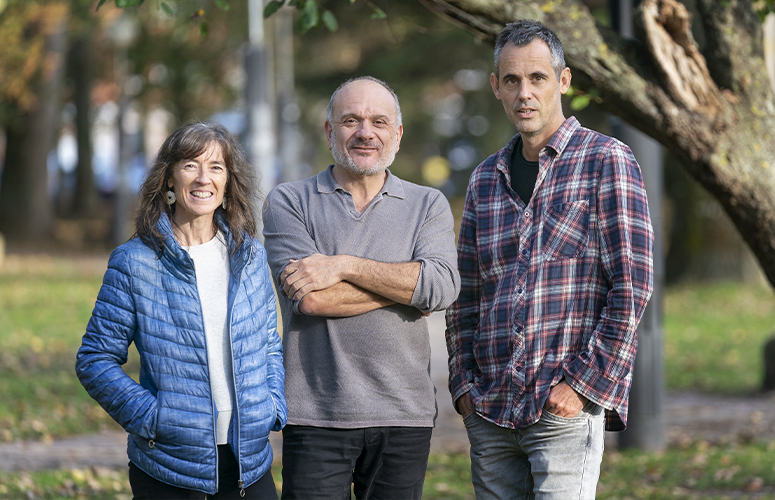Mountain grazing, together with quality products, brings socio-ecological benefits to society. This is one of the conclusions of a research project led by the UPV/EHU, and which also proposes a multidisciplinary participatory methodology to manage the conflicts that may arise regarding mountain grazing, and to combine different interests.
Socio-ecological benefits of mountain grazing
Interdisciplinary research at the University of the Basque Country (UPV/EHU) proposes sustainable models for this livestock system
- Research
First publication date: 22/11/2022

The SOSTEPASTO project (Mountain grazing: quality and traceability of traditional foods, biodiversity, system adaptation to global change and rural development) has shown that mountain grazing systems can bring multiple socio-ecological benefits to society. This is a multidisciplinary study with the participation of Luis Javier Rodríguez-Barrón of the Lactiker research group, Arantza Aldezabal of FisioClimaCO2, and Eneko Garmendia of the Department of Applied Economics and the ekopol group.
As the researchers explained, from an ecological point of view, mountain grazing systems can help maintain biodiversity and the high nutritional quality of pastures, while reducing soil CO2 flux. “The research shows that healthy, high-quality food can be produced from flocks grazing on mountain pastures. Not only have the characteristic sensory traits been found in the cheese produced from these flocks, but a healthier fatty acid profile and a higher presence of health-promoting antioxidant compounds have also been identified.”
Furthermore, from a socio-economic perspective, the study shows that mountain grazing systems can generate jobs and income in rural areas with few economic alternatives, thus avoiding the creation of a livestock system heavily dependent on subsidies. “To reduce this dependency and ensure a decent income, the study shows how important it is for shepherds to own the entire value chain,” they said. The data collected show that Idiazabal cheese producers achieve higher returns and level of employment than those producers who sell their milk to the industry. So dependence on subsidies by shepherds producing cheese is significantly lower compared with other livestock farmers.
In relation to the economic viability of mountain grazing, the work indicates that communal mountain pastures contribute decisively to the survival of these systems. As the researchers specified, “besides providing a significant percentage of the fodder needed by sheep, common pastures raise numerous financial subsidies channelled through the Common Agricultural Policy, because of the ecological benefits they generate, among other things. To guarantee these ecological benefits, it is essential to promote sustainable management models in line with decent working conditions”.
It is not easy to promote sustainable management models. Mountain pastures are multifunctional systems and there are often conflicts between various interests. One of the main objectives of this research project was to analyse the contribution of multidisciplinary collaboration in the building of more sustainable models. “The integrative methodological proposal produced shows that it is possible to identify and analyse the benefits and harm of the different management models in a transparent way. These features, together with the participation of different stakeholders, are essential in promoting more sustainable models and in addressing the current challenges of mountain grazing,” they concluded.
Additional information
The SOSTEPASTO project (Mountain grazing: quality and traceability of traditional foods, biodiversity, system adaptation to global change and rural development), which is funded by the Ministry of the Economy and Competitiveness, has had the collaboration of researchers from the Department of Pharmacy and Food Sciences, the Department of Plant Biology and Ecology, and the Department of Applied Economics at the University of the Basque Country (UPV/EHU), together with researchers from the Basque Centre for Climate Change (BC3) and the Autonomous University of Barcelona (UAB).
Bibliographic reference
- Social multi-criteria evaluation for managing biodiversity conservation conflicts
- Land Use Policy 109, October 2021, 105658
- DOI: 10.1016/j.landusepol.2021.105658
- Sustainability assessment of pasture-based dairy sheep systems: A multidisciplinary and multiscale approach
- Sustainability 2021, 13(7), 3994
- DOI: 10.3390/su13073994
- The contribution of the commons to the persistence of mountain grazing systems under the Common Agricultural Policy
- Land Use Policy 117, June 2022, 106089
- DOI: 10.1016/j.landusepol.2022.106089
- Mountain sheep grazing systems provide multiple ecological, socio-economic, and food quality benefits
- Agronomy for Sustainable Development 42, 47 (2022)
- DOI: 10.1007/s13593-021-00751-7


